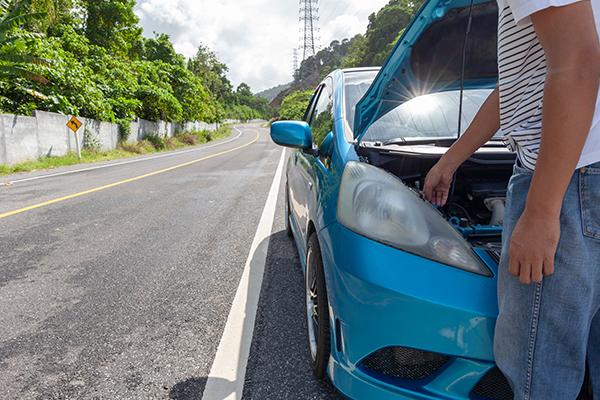
Book online or Freephone 0800 5244 780
Summer driving tips
We often hear lots about staying safe when driving in the winter and how to prepare for the season when you’re on the road. However, although the summer generally brings better driving conditions and longer daylight hours, some issues can still be hazardous.
Here are our top five factors to consider and suggestions to keep you safe and secure behind the wheel all summer long.
Beware of overheating
 There are lots of reasons why a vehicle may overheat in the summer
There are lots of reasons why a vehicle may overheat in the summer
There are lots of reasons why a vehicle may overheat in the summer, so if your heat gauge starts climbing or you have smoke billowing from the bonnet, there could be a couple of the likely culprits, including a leak, blocked hose or damaged water pump.
One simple reason for overheating is coolant issues, even when there are no other problems with the cooling system. Just the wrong type of coolant or the incorrect coolant-to-water ratio can stop your engine from staying cool, and this is more common than you think. If your vehicle has been fine during the colder months but begins to overheat as it gets warmer, this could be a sign you’ve not used a suitable coolant. So flush your system, add the proper mix or pop along to your garage to get it checked.
Don’t be dazzled
 To minimise the risk on a sunny day, drive with your visor down, clean your windscreen and wear those sunglasses.
To minimise the risk on a sunny day, drive with your visor down, clean your windscreen and wear those sunglasses.
Back in 2013, around 3,000 accidents a year were down to the sudden glare of the sun whilst driving. Believe it or not, the sun can be as dangerous as the snow and rain, and an unexpected dazzle can cause you many problems, especially if you’re driving at speed. So, to minimise the risk on a sunny day, drive with your visor down, clean your windscreen and wear those sunglasses. These may all seem obvious, but make sure you have done all three before setting off into the sunshine. Visors and sunglasses can reduce the glare, whilst a clean windscreen will stop the sunlight from refracting through the muck; bright sunlight can reduce visibility as much as thick fog when it shines through a dirty windscreen.
Get the hayfever under control
 As silly as it may sound, sneezing whilst driving can be extremely dangerous
As silly as it may sound, sneezing whilst driving can be extremely dangerous
Anyone suffering from hayfever will know how it can affect your eyes and nose and when you’re driving, you need to make sure that any illness, no matter how mild, is under control. If you have hayfever, always make sure you take your medication before driving to minimise the symptoms. Any medication you take should be the non-drowsy variety (never drive when you’re feeling tired), and give yourself a little time after you take it before you get behind the wheel. As silly as it may sound, sneezing whilst driving can be extremely dangerous, especially when driving on a motorway at 70 mph. Research has found a driver will take their eye off the road for two seconds when sneezing, meaning 155 feet covered with closed eyes. So keep a good supply of tissues, keep windows closed and, most importantly, slow down if you feel the need to sneeze.
Be patient
 Passing a slow-moving tractor needs to be done with care
Passing a slow-moving tractor needs to be done with care
Summer is a busy season in agriculture, and tractors are a common sight on the road at this time of year. Naturally, no one likes to be stuck behind a tractor, especially when you have time commitments. However, passing a slow-moving tractor needs to be done with care. Many agricultural vehicles have soundproofed cabs, and some tractor drivers wear ear protectors, so they may not be able to hear approaching cars. Tractors may also be longer than you anticipate and may have a loader on the front. Before overtaking, make sure you have plenty of room and time to get past. The road ahead should be clear and free from bends or hills. You should also check the road markings to ensure that overtaking is allowed on that stretch of road. Finally, be aware that tractors only have to have brake or indicator lights if driving at night, meaning they may stop or turn suddenly and without warning in daylight hours.
Beware the British weatherThe season definitely brings better conditions on the road and less to worry about. However, British summer weather can be temperamental, as we know. Summer rainfall can cause flash flooding, which is very dangerous on the road, especially if you hit a patch of water at speed. Rain can also cause dried mud and other road debris to become slippery, which can be hazardous if you hit it at any speed. So take care when driving and adjust your speed and distance when faced with rain or any sudden downpours.
These are, of course, just a few of the problems you may face during the summer. However, no matter the season, the key is always to be road aware, no matter where you are going. Prepare for the conditions, drive with care and consideration, and always expect the unexpected from the British weather.
The season definitely brings better conditions on the road and less to worry about. However, British summer weather can be temperamental, as we know. Summer rainfall can cause flash flooding, which is very dangerous on the road, especially if you hit a patch of water at speed. Rain can also cause dried mud and other road debris to become slippery, which can be hazardous if you hit it at any speed. So take care when driving and adjust your speed and distance when faced with rain or any sudden downpours.
These are, of course, just a few of the problems you may face during the summer. However, no matter the season, the key is always to be road aware, no matter where you are going. Prepare for the conditions, drive with care and consideration, and always expect the unexpected from the British weather.
